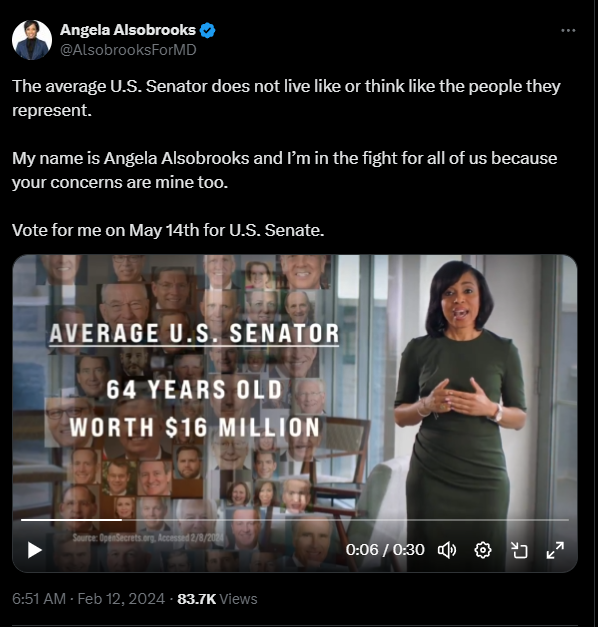The problems with how the two Maryland Democratic U.S. Senate Primary frontrunners treat each other and with their resumes
Yes, I am using my own news website to promote my ideas I am putting forth as a candidate for U.S. Senate for Maryland and I won’t apologize for it! This is part of a series of articles discussing my ideas to fix America as a future U.S. Senator.
By Brian E. Frydenborg (Twitter @bfry1981, Threads @bfchugginalong, LinkedIn, Facebook, Substack with exclusive informal content) March 2, 2024; *UPDATE 3/19: further discussion and a correction when it comes to the rarities and risks of a county executive as a U.S. Senate candidate; see all of Brian’s Maryland U.S. Senate race coverage here; because of YOU, Real Context News surpassed one million content views on January 1, 2023, but I still need your help, please keep sharing my work and consider also donating! Real Context News produces commissioned content for clients upon request at its discretion.
SILVER SPRING—The two-frontrunners in this Senate race have shamelessly attacked each other not primarily on the issues, but on accusations they would not dare level against Ben Cardin, the man they are trying to replace, even though they are applicable to him and should not count as a negative.
We can’t replace a man of the stature and accomplishments of Ben Cardin with just anyone. And we sure should not replace him with someone with relatively little national-level policy or no international affairs experience, as Cardin has long been a leader on both the national and international stage.
Disappointing David
I am writing about Rep. David Trone’s repeated attacks against County Executive Alsobrooks as a “career politician.” Well, let’s look at the amazing Ben Cardin’s career up until his successful U.S. Senate campaign: even before graduating first in his class at the University of Maryland School of Law, he was elected to the Maryland House of Delegates and began in 1967 what would be 20 years in the chamber, the last ten of which he served as its Speaker, only the second Jewish-American to do so. He would then run for the U.S. House, where he began serving in 1987 for another 20 years. That was 40 years of government experience he had, then, when he ran for the U.S. Senate in 2006, winning the election and holding that office in the more than 17 years since then. In each chamber—the Maryland House of Delegates, the U.S. House, and the U.S. Senate—Cardin was a leader and chaired multiple important committees, working on major issues of both national and international significance. He has been a leader on, among others issues, environmental policy and international human rights—the latter including the landmark Magnitsky sanctions legislation he bipartisanly coauthored with the late Sen. John McCain, targeting Russian and other officials responsible for human rights violations. This legislation of Cardin’s so drew the ire of Russian President Vladimir Putin that his agents approached the Trump campaign in that infamous Trump Tower meeting in 2016 to offer dirt on Hillary Clinton in exchange for relief from the Magnitsky sanctions in effect (an odious incident I have written about in detail). A career politician to be praised with a career to be proud of, to be sure.
But Rep. Trone attacks County Executive Alsobrooks for being a career politician. Like Cardin, she also went to the University Maryland School of Law until graduating in 1996, after which she worked as a law clerk before becoming an assistant state’s attorney for Prince George’s County from 1997-2002, when she began working in various roles in the Prince George’s county executive office from 2002-2010. That year, she won election as the Prince Goerge’s County state’s attorney, a role in which she served the county from early 2011 to late 2018 for nearly eight years until she won election and began serving as its County Executive.
From Rep. Trone’s attacks, we are supposed to look negatively at Country Executive Alsobrooks’s nearly three decades of public service because she has made public service her career. While using “career politician” as a pejorative—almost as a form of attacking identity as public servants—is commonplace in today’s politics, it is a non-sequitur and beneath Rep. Trone, distracting from his solid five* years of public service in the House. Should we think less of him were this to be many years of service in the House as a “career?” Is a career as a businessman running a major wine retail company superior to one of public service? Do not many public servants constantly engage with their constituents, hearing directly from them and assisting them and making a difference in their lives? Are assumptions that “career politicians” are “out of touch” and “don’t know how the world words” themselves non-sequiturs? Again, these do not logically follow as lines of attacks and make no sense. Rep. Trone should do better than that and engage with County Executive Alsobrooks on substance and the issues rather than denigrate public service.
Alsobrooks Also Guilty
Country Executive Alsobrooks cannot be said to be treating her opponent better, sadly. A disappointingly large number of her campaign e-mails are fluff, simply asking for money, or attacking Rep. Trone by dismissing him simply as a rich guy “buying” the campaign with a lot of money.
Some history here is relevant: Bernie Sanders, of all people, outspent Hillary Clinton in 2016 and lost while she outspent future insurrectionist Donald Trump in the general election and lost; Biden was outspent in 2020 by Bernie and other rival Democrats, too, all who lost; and Trump was outspent by some of his rivals in the 2016 primaries who lost and has been outspent by some of his 2024 primary opponents who lost or will not win. Increasingly, money doesn’t equal victory and a good or even better candidate with better-run campaign can defeat a much-better-funded opponent. As for wealth, Senator Gracchus is instructive in Gladiator: “I don’t pretend to be a man of the people. But I do try to be a man for the people.” Some of the greatest American presidents—Washington and FDR, for example—were wealthy elites, as is Nancy Pelosi, perhaps the greatest Speaker of the House in American history. John, Bobby, and Teddy Kennedy may all have been born with silvers spoons in in their mouths as part of a dynasty, but they fought hard for working class Americans and were some of the most beloved figures in modern American political history. Such classist attacks are beneath County Executive Alsobrooks and avoid the real issues at hand.
Country Executive Alsobrooks has also attacked Rep. Trone indirectly in ageist terms in addition to the wealth issue: her pinned tweet—the message she and her campaign wanted to emphasize above all else—for quite some time until just days ago made a big deal about age, with text that reads: “The average U.S. Senator [sic] does not live like or think like the people they represent. My name is Angela Alsobrooks and I’m in the fight for all of us because your concerns are mine too. Vote for me on May 14th for U.S. Senate” with a video highlighting amidst a backdrop of mostly old, white, male faces that the average age of a U.S. senator is 64 (Trone is 68 and a billionaire through his Total Wine business). The unmistakable takeaway of County Executive Alsobrooks is that “Old rich white men don’t represent you, so don’t vote for them, vote for me instead because I’m not those things!” Alsobrooks is a 53-year-old African-American woman and much of her messaging is that her gender, race, and, it seems now, age are some of preferred reasons why she thinks she should be a senator and not Trone (I am 42 and have much less wealth than either Trone or Alsobrooks, does that mean I am a better candidate?).

I didn’t see Ben Cardin in Alsobrooks’s backdrop, but it may as well have been included. Certainly, Cardin had some wealth by 2006 and he was that exact average age of 64 highlighted by Alsobrooks when he ran. Alsobrooks, then, may as well be attacking Cardin for being an old white man of wealth who, along with most other senators, “does not live like or think like the people they represent.” So ageism is fair “political” game, as in the unfair and just-plain-inaccurate ageist attacks against Joe Biden, who despite his age (and in part because of his wisdom coming from it!) has the best first few years in office of any president in my lifetime and the most substantive legislative accomplishments in his first few years of any president since LBJ, myopic media coverage and the ignorance and irrational emotions of far too many voters be damned. Speaker Pelosi also was subjected to unfair ageism; the way Alsobrooks attacks Trone, she may as well attack Pelosi and Biden while she’s at it.
To be clear, I absolutely know the obvious truth that we need a more representative Senate, along with many other institutions, and I have called for addressing the gross imbalances in Senate representation. In principle, I welcome more diverse candidates, including those meeting Country Executive Alsobrooks’ demographic profile. But candidates need to take a page from the historic candidacy of Barack Obama: not have one’s identity be the cornerstone of one’s sell in a political campaign (even if it is included), but ideas and vision. Just ticking off a policy list in message focused on attacking an opponent based on his identity or privilege—not his ideas, values, or record—fails the Obama test and simply adds to the cynicism and an identity-focused politics that often (though not always) proves to be more shallow and divisive than focusing on the issues and the differences between candidates on them.
We Must Ask for Better: Consider Me a Third Option!
Both Trone’s and Alsobrooks’ attacks on each other not only do a disservice to each other, to voters, the Democratic Party, and the issues, but also to our amazing leaders like Biden and Pelosi who have led us exceptionally well through troubled waters, and, yes, those leaders include Ben Cardin, whose massive shoes they are trying to fill and seem ill-fit to do so based on these and other factors.
I am looking to quickly establish myself as the #3 Democrat in this race to fill Ben Cardin’s legendary shoes, giving the two sniping at each other discussed above some real competition. I fully admit that I do not have anywhere near the relevant experience that Ben Cardin had when he ran for the U.S. Senate in 2006, but neither do Rep. Trone or County Executive Alsobrooks. I call on each to end their cynical attacks against each other not focused on the issues and policy, which need to be the center of the conversation. They can do better, and so can we. That’s why I am running, and while I mentioned that the three of us pale in our relevant resumes, that does not mean that do not I possess far more experience in relevant areas than either of the two frontrunners.
While I am impressed with Trone’s record from his one-and-a-half terms in the House—five* years in Congress—that is not very deep, and however impressive his much-longer record as a businessman running Total Wine is, I have always felt business experience is commonly overrated when looking at political candidates: it is notable that there have been only two major party nominees for the presidency in U.S. history who were businessmen with no serious public service experience—Republican Wendell Willkie who challenged FDR in 1940 (and who wasn’t such a bad guy) and, ahem, insurrectionist Trump (who is an absolutely terrible man)—and this is quite telling: a liberal version of Mitt Romney with less government experience is not ideal for the Senate. For most of his life, Trone has been focused on his family and his business, and that’s great: that’s the American dream. But I do not consider that a plus weighed against a career of public service or working on the major issues the Senate is tasked with handling, so though I am happy to have Trone in the House building on his new record of public service there, the Senate as a legislative institution benefits from more public policy experience in candidates.
*UPDATED DISCUSSION 3/19: And as impressive as Alsobrooks’s not-to-be-derided career as a public servant of Prince George’s Country for many years is, I looked and tried hard to find any example in U.S. history of a someone who went from leading a county to going directly into the U.S. Senate: I could not find one for some time with the search terms I used, but after weeks of back-and-forth, some Alsobrooks supporters themselves discovered and pointed out that Joe Biden in 1972 and Chris Coons in 2010 both went from being county executives in Delaware to U.S. senators (Coons beat the amateurish and laughable Tea Party Republican Christine O’Donnell, a former self-proclaimed practitioner of witchcraft, in the general election; Biden’s youthful campaign and historic win over half-a-century-ago over an old Republican incumbent who had been considering retirement was far more impressive and an exceedingly rare occurrence; Larry Hogan is certainly neither of these people and presents a far more formidable challenge). These two examples hardly change the reality that virtually no candidates goes from being county executives directly to being in the U.S. Senate. After all, there are over 3,100 county or county-equivalents in the U.S. (not including U.S. Territories) and the only two examples we came across were thus far were two people spread out over nearly forty years from one of the smallest states in the Union—Delaware—with just one single U.S. House representative and some of the smallest pools or both population and office-holders from which to draw U.S. Senate candidates (perhaps we can uncover a few more? Let me know if you do! But even if there were ten or more further exceptions, it would not change the underlying rareness). With over a century of direct popular elections for the U.S. Senate and thousands of county leaders each year as potential candidates, that only two are identified thus far by those Alsobrooks supporters does not make a strong case that county-executives in terms of their office and responsibilities are considered, generally, prime U.S. Senate candidates. And there is good reason for that: it’s not that county-level issues and workings are less important than state-level or federal-level ones—they are not: we need great public servants and policy at the local level as much as at the state, national, and international levels—it’s that we are truly dealing with apples and oranges. They are not legislators as state legislators are, with very similar roles and responsibilities. The issues county executives handle are of vastly different scales, approaches, and mechanisms. The learning curve would be extreme and far from ideal. If this were not the case, we would have seen far more county executives in U.S. history going directly into the U.S. Senate from those county leadership positions. But we almost never do (conversely, I also do not think most U.S. Senators would be ideal to handle Alsobrooks’ roles and responsibilities or those of any other county executive). This is not about Alsobrooks as an individual, then, but the different nature of the two offices. Given how extremely rare it is for anyone of any background, race, or gender to go from county executive directly to U.S. Senate, the burden is on Alsobrooks and her supporters to make the case as to why, specifically, the experience of a county executive is is particularly transferable to the U.S. Senate’s current environment—beyond simply stating how great they think she is—rather than the burden being on voters who are skeptical to justify their skepticism against popular well-known Larry Hogan who has a profile across the state that far exceeds that of either frontrunner and a lot of bipartisan support in his victories as candidate for governor. None of this means that it is impossible for Alsobrooks to beat Hogan (for now she is still polling far behind Trone, though), and if she won the nomination I would be proud to support her, but it does make her candidacy a far riskier one and anyone thinking this will not be an issue for many voters in the general election against a candidate of the stature of Hogan are deluding themselves; pretending this does not matter matter and refusing to deal with it in the primary before it would definitely become an issue in the general election does not serve to forge Alsobrooks into her strongest as a candidate and hardly puts her in the best possible position to defeat Hogan if she were to win the nomination.
Again, both Trone and Alsobrooks would be facing the popular recently-former Maryland Governor Larry Hogan, who has already shown his ability to win statewide office as a Republican in a heavily-democratic blue state. But we need a strong Democrat to defeat him because to defeat MAGA Trumpist insurrectionist fascism, we don’t need Ben Cardin’s seat filled by the Joe Manchin of the Republic Party, not matter how moderate he is.
Yet the lack of both Trone’s and Alsobrooks’s experience engaging on national-level and international-level issues disturbs and worries me; it did before Hogan entered the race and it worries me more now. The latest non-partisan poll showed Trone in a statistical tie with Hogan and Alsobrooks losing handily to Hogan (less-reliable campaign/partisan polls also show a muddied picture). None presented a strong outlook for Democrats against Hogan, and while these numbers can change, this is not a good sign and a sign that voters are looking for something more.
That can be me.
Ben Cardin was a leader not just on national-level issues, but international ones. I am the only one between myself and the two-frontrunners who has any serious international-level experience: both my academic and professional careers for over two decades have produced top-notch international affairs understanding and analysis. From being a journalist, academic, and analyst to studying and living over five years in the Middle East (ask me about Israel and Hamas, and compare to what the frontrunners have or don’t have to say), from political work and consulting in the U.S. to working in Jordan in the NGO, international development, and humanitarian aid fields, I bring a type and longevity of experience on national- and international-level issues that both the frontrunners lack. I have been published by numerous major institutions and publications in the U.S. and abroad, with a global audience and more Twitter followers than the two frontrunners’ campaigns combined (and let’s expand that lead!). My expertise ranges from Russia’s war in Ukraine—my work on that being praised by former military leaders, a sitting congressman, and even Ukrainian government officials—and Russian election interference to gun violence and racism in America (I’ve been attacked by the NRA and Russian trolls for good reason!).
Perhaps most importantly, I have by far the most detailed plans and legislative proposals on a range of issues on my site compared to my frontrunners’ less robust policy sections on their sites. And while I may not have held elected office, understanding the nuts and bolts, the inner workings, and complex dynamics behind Senate-level policymaking, international diplomacy, and war and terrorism can be just as valuable and even more so in making an elected office work, especially as a U.S. senator.
So if you want the person who will avoid petty attacks and with the longest record of engagement on national- and international-level issues and the most-detail plans to make talk of change a reality, vote for me, Brian Frydenborg, to represent Maryland in the U.S. Senate.
*Corrections appended: Rep. Trone has served five years in the U.S. House, correcting an earlier mistake of citing three years of service; after some Alsobrooks supporters pointed out two examples of country executives who went directly to the U.S. Senate (both from Delaware), I discussed that after earlier stating I had been unable to find examples.

Come see Brian debate other candidates, including the two frontrunners, TODAY in Silver Spring, moderated by Washington Post columnist Jennifer Rubin. I wrote about why this debate is so important for me. Register here now as space is filling up! You can also sign up to watch via Zoom here! See related March 6 article Maryland U.S. Democratic Primary Debate Raises Questions on Frontrunners’ & Party’s Readiness to Take on Hogan. Can Frydenborg Emerge As Third Option? and see all of Brian’s Maryland U.S. Senate race coverage here as well as Brian’s official campaign website.

© 2024 Brian E. Frydenborg all rights reserved, permission required for republication, attributed quotations welcome
Also see Brian’s eBook, A Song of Gas and Politics: How Ukraine Is at the Center of Trump-Russia, or, Ukrainegate: A “New” Phase in the Trump-Russia Saga Made from Recycled Materials, available for Amazon Kindle and Barnes & Noble Nook (preview here).

If you appreciate Brian’s unique content, you can support him and his work by donating here; because of YOU, Real Context News surpassed one million content views on January 1, 2023. Real Context News produces commissioned content for clients upon request at its discretion.
Feel free to share and repost this article on LinkedIn, Facebook, Threads, and Twitter. If you think your site or another would be a good place for this or would like to have Brian generate content for you, your site, or your organization, please do not hesitate to reach out to him!
